Black people don't swim? Milwaukee man who called out that hogwash to get honor. | Opinion
- Oops!Something went wrong.Please try again later.
Todd Jackson taught me how to swim when I was 41 years old, no small feat after I nearly drowned at Wisconsin Dells as a child when a teenager thought it would be fun to pull me out to the deep end in an inner tube and then snatch it away. I couldn’t swim. I panicked and sank to the bottom.
A lifeguard dove in and dragged me to shore, and used mouth-to-mouth to resuscitate me. I feared the water from that point forward. I was able to avoid swimming in high school and deep water for most of my life until the drowning of Kamonie Slade, a 12-year-old boy who died while attending his seventh-grade class trip to Mauthe Lake in the northern Kettle Moraine Forest in June 2010.
I decided it was time that I overcome my fear. I contacted the Milwaukee Recreation program, and Jackson told me he would give me private lessons. The only thing he asked in return was that I spread the word about the importance of water safety, which I chronicled in several columns.
More than a decade later, Jackson is being honored with the 2023 Barbara Leszczynski Customer Service Award for his commitment to Milwaukee Recreation, teaching 1,000 people to swim and providing exceptional customer service. Leszczynski is a former Milwaukee Recreation clerical team member known for her empathy.
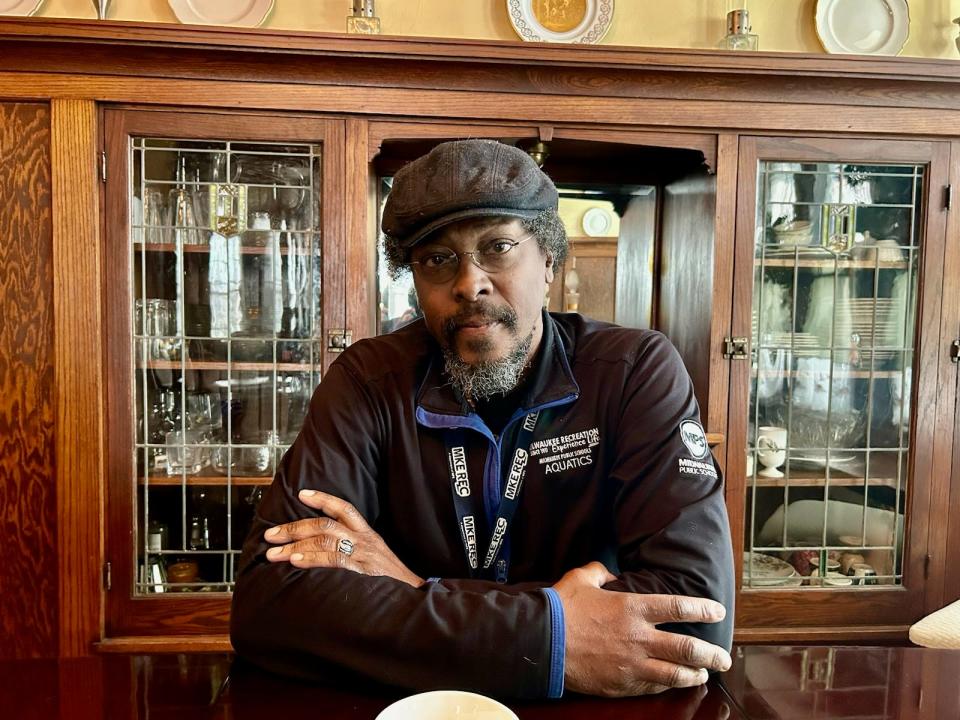
“The energy Todd brings to any space he occupies lightens the room. He is always a team player, and his work ethic knows no boundaries,” said Nicole Jacobson, manager of citywide programs and aquatics supervisor for Milwaukee Recreation.
After overcoming his own challenge that temporarily took him out of the pool, he's continuing his focus on water safety and ensuring people of color learn to swim - a job made harder by the fact that pools continue to close at public schools throughout Milwaukee.
“Drownings are preventable. If a child knows how to float on his back and call out for help or get to a place where he can breathe and not panic, we have done our job," Jackson said. "Swimming is secondary to the safety and well-being of a child or an adult in the water."
Swimming associated with segregation, access denied by race
Learning to swim is a rite of passage many don't think twice about, but the statistics don’t lie: Sixty-four percent of African-Americans, 45% of Hispanics, and 40% of white children have few to no swimming skills, according to the website Stop Drowning Now.
African-American children ages 5 to 19 drown in swimming pools at rates 5.5 times higher than white children of the same age, and 79% of children in households with incomes less than $50,000 have few to no swimming skills.
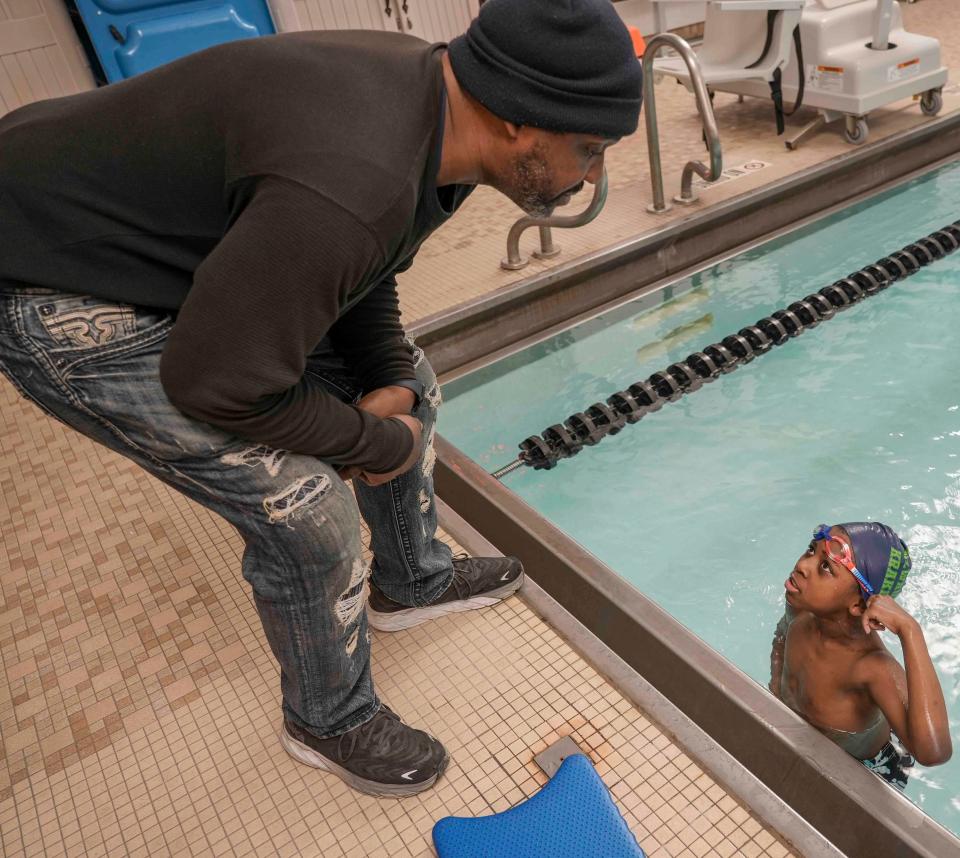
Jacobson said when she hears references that "Black people don't swim" she cringes because people fail to talk about the numerous incidents America where whites terrorized Blacks when they did swim at public pools. There was forced racial segregation of pools and beaches in the South and in the North there were where white swimmers who were encouraged to attack blacks and even put cleaning fluid or even acid into pools where Black children were swimming.
Milwaukee Recreation has been working hard to close the gap in swimming by investing in pools and continuing to offer free lessons. Through the rec’s elementary, secondary, and school emergency relief funding, they will repair and remodel 10 pools in Milwaukee Public Schools. Unfortunately, Bay View, Marshall and West Division’s pools will not be renovated because the infrastructure in those buildings does not support the needed work.
The department will build a new pool at North 76th and West Silver Spring by 2026. Renovating a pool costs a lot of money, and the only way many schools get their pools updated is through a referendum, private donations and matching funds.
For instance, in 2021 Wauwatosa East High School opened its $10.4 million aquatic center with eight lanes. The project was paid for with $5.7 million in donations from a pair of Wauwatosa High School alums, $1.7 million in matching funds from the school district, and $3 million from interest income from the district's $124.98 million referendum in 2018.
In Milwaukee, there has been a divestment in swimming over the years that has featured many pool closings. While the investment in MPS pools is welcome, based on the 600,000 residents living in the city proper, there are not enough swimming pools. Jacobson said. Milwaukee has 13 pools in its public school system, 10 of which are eligible for improvement or renovation, but the city should have about 30 pools.
Over the years, Milwaukee has closed the pools at Dineen, McGovern, Gordon, Jackson, Washington Parks, and Moody Pool, where my wife and many others learned to swim. Keeping pools open to teach young people and adults how to swim is worth the investment, especially since Blacks and Hispanics are the ones who suffer the most from accidental drownings.
"There is trauma related to water in our history, and it doesn't take interviews with families who lost a loved one to a drowning to know this," she said.
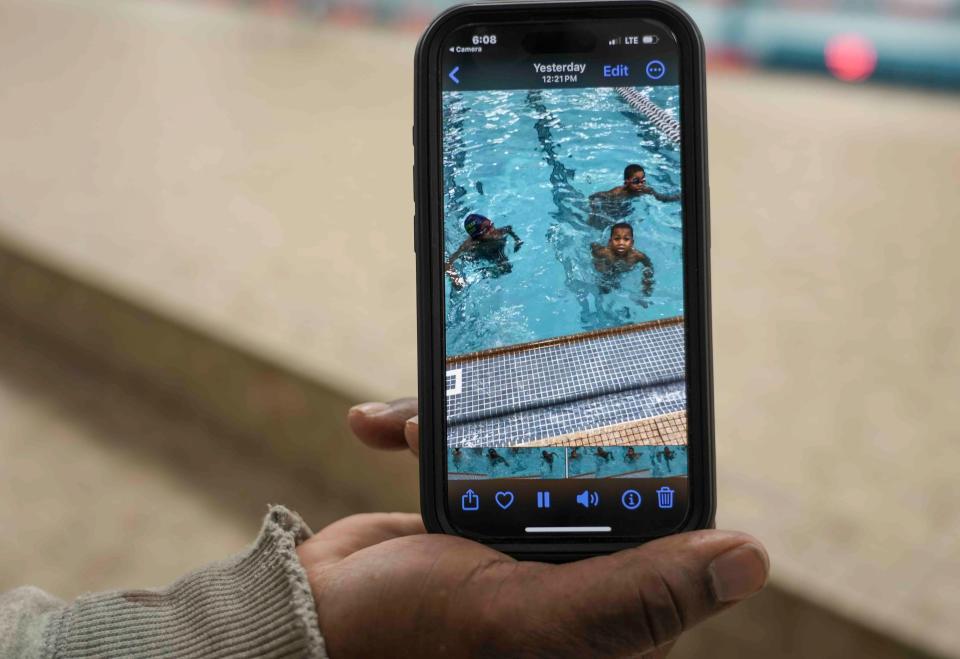
Last week, Milwaukee County Parks announced that it has been dealing with a lifeguard shortage over the past few years, leading to the number of pools closing the previous summer. Jackson said swimming classes and open pools feed the lifeguard system.
“Swim teams at the high schools and open pools feed the lifeguard pipeline. When pools are closed, it cuts off that system.”
That means fewer people will have an opportunity to conquer their fear or learn to effortlessly glide in the water like Jackson.
After years in the pool, swimming instructor forced out of the water
When I arrived at the pool for my first lesson, Jackson was already doing laps. His strokes were smooth and effortless. He glided through the water. He encouraged me to get in the pool on the shallow end. I was fine until the water reached my chest. I started to hyperventilate. He took me by the hand and explained to me the power of trauma.
I wanted to quit, but he insisted I could overcome my fear. By the end of our first lesson, he had me floating on my back with his hands under me.
“I knew if I got you comfortable enough to float on your back and not panic, I could teach you how to swim,” Jackson said.
Within a month, I was comfortable enough to swim the length of the pool. Jackson helped me overcome decades of fear. Three years after teaching me how to swim, Jackson faced his most significant life challenge after he was diagnosed with Stage 4 throat cancer.
Although he beat cancer, it took away one of the most essential things in his life – swimming.
“I’ve been in the water all my life. I honestly can’t remember when I haven’t been in the water,” Jackson said.
Jackson pivoted from the pool to the office and now serves as Milwaukee Recreation’s COVID-19 Safety Supply Resource manager. When programs started to reopen during the pandemic, Jackson ensured that people were safe by supplying masks and other safety materials to hundreds of sites in the city.
Swim community came together to help fund cancer treatments
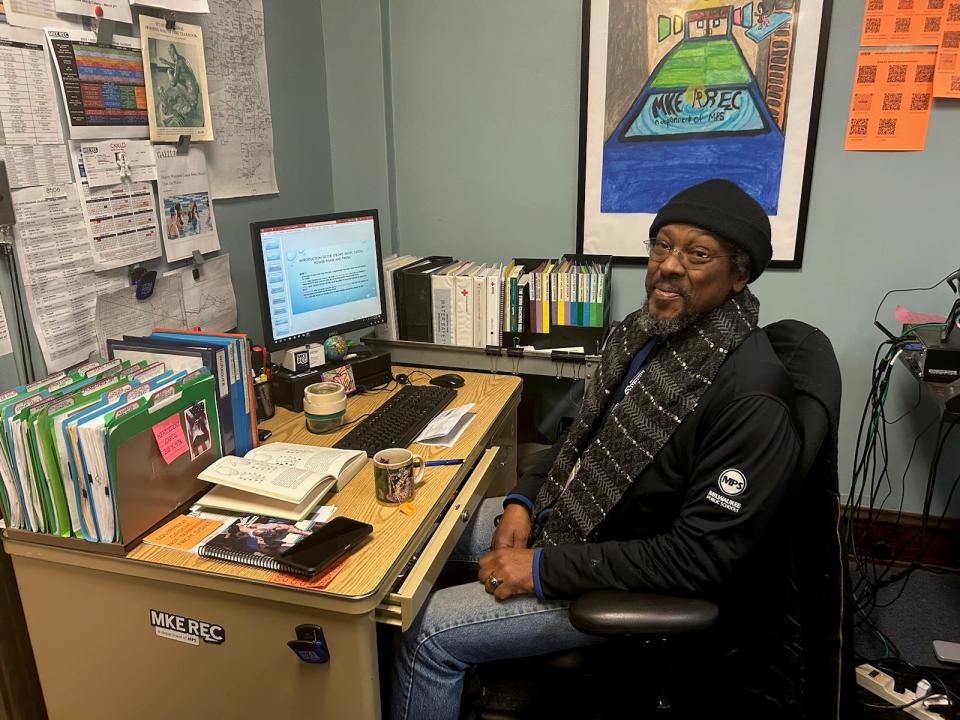
Jackson started to notice that his voice was getting “raspy” in 2011, but he thought it came from coaching lifeguards, water aerobics, and working with youth.
“My wife told me that I should go to the doctor to get my voice checked out, but I guess I was stubborn and figured my voice would come back with rest,” Jackson said.
He started having difficulty swallowing. Then, one night, his wife woke him up out of his sleep. His skin was gray, and they immediately went to St. Luke’s Hospital.
He was placed on oxygen, and they ordered a biopsy on his throat. It was discovered he had laryngeal cancer, a disease that usually affects heavy smokers over the age of 55. Doctors discovered a golf ball-sized tumor growing on one of his vocal cords. Jackson, a health nut, never smoked a day in his life.
He believes the cancer came from being around chlorinated pools most of his life.
In 2013, surgeons removed the growth and saved his voice box. He started chemotherapy and radiation treatments. He had a feeding tube inserted for six months, and his weight dropped from 220 pounds to 115.
The swim community aided him by dropping off gift baskets, cards, and phone calls and shoveling his snow. To help offset Jackson’s nearly $1,000-a-day chemotherapy treatments, swimmers organized a swim-a-thon, raising money for every lap
“I was, and I’m still overwhelmed by their generosity,” Jackson said.
By December 2013, just 10 months after being treated for laryngeal cancer, Jackson wanted to get back in the pool. Doctors gave him a cap over his trach tube to keep water out. He went to the Pulaski pool but realized how much his body mass had changed. He didn’t have the strength to stay buoyant, and the chlorine irritated his throat.
Love of water comes from his firefighter father
It’s not hard to understand why Jackson wanted to get back in the water. It’s all he knows, said his father, Donald Jackson, who worked for the Milwaukee Fire Department for three decades and became the first African American to be promoted and serve in levels for fire captain, battalion chief, deputy chief and assistant chief.
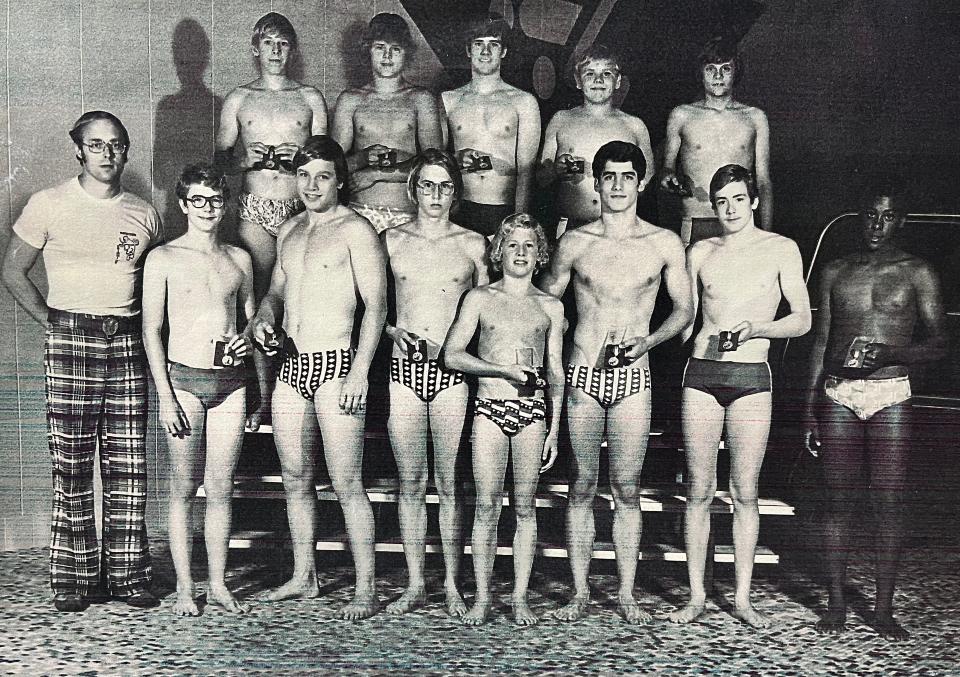
Donald Jackson was also a member of the department’s water dive team.
“I had all my kids in the water before they could walk. I believe I had Todd in the pool before he was even a year old,” Jackson said.
Donald Jackson, 83, still swims two miles daily Monday-Saturday at the Schroeder Aquatic Center in Brown Deer and competes at the masters level for his age group.
“Swimming is the one sport you can do all your life. You can’t play basketball forever. You can’t play football forever. You can’t play soccer forever. But you can swim forever because it’s not jarring on your joints,” Jackson said.
Jackson said his son is determined to return to the pool. “He’s stubborn, just like me. He will do whatever he sets his mind to. It’s all he knows,” Donald Jackson said.
Todd Jackson said one of his best memories in the pool was finally beating his father in a 50-meter race when he was 13. On the day of the race, Todd said, he was stroke for stroke with his father before he edged the firefighter out by a hand.
Donald took the loss gracefully and asked his son how he wanted to celebrate the victory.
“We went to Jake’s for a corned beef sandwich on rye, but this time, I was able to get a whole one instead of splitting one with my dad,” he said.
The two went to the lakefront and ate their sandwiches while watching the waves.
“That was one of the best days of my life,” Todd Jackson said.
Email James Causey at jcausey@jrn.com; follow him at X@jecausey.
Event information
What: Todd Jackson Customer Service Award
When: Thursday, Feb. 8, 11:30 a.m. to 1 p.m.
Where: OASIS Cafeteria, 2414 W. Mitchell St.
The event is free and open to the public
This article originally appeared on Milwaukee Journal Sentinel: Milwaukee Rec instructor takes fear out of water for students

